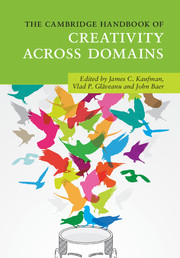Book contents
- The Cambridge Handbook of Creativity Across Domains
- The Cambridge Handbook of Creativity Across Domains
- Copyright page
- Dedication
- Contents
- Figures
- Tables
- Contributors
- Acknowledgments
- Part I Creativity and Domain
- Part II Creativity in the Traditional Arts
- Part III Creativity in the Sciences
- Part IV Creativity in Business
- Part V Newer Domains for Creativity Research
- Part VI Creativity in Everyday Life
- Part VII Conclusion
- Index
- References
Part III - Creativity in the Sciences
Published online by Cambridge University Press: 15 September 2017
- The Cambridge Handbook of Creativity Across Domains
- The Cambridge Handbook of Creativity Across Domains
- Copyright page
- Dedication
- Contents
- Figures
- Tables
- Contributors
- Acknowledgments
- Part I Creativity and Domain
- Part II Creativity in the Traditional Arts
- Part III Creativity in the Sciences
- Part IV Creativity in Business
- Part V Newer Domains for Creativity Research
- Part VI Creativity in Everyday Life
- Part VII Conclusion
- Index
- References
Summary
It is not uncommon for people to gloss over the high degree of creativity involved in science. The physical sciences (physics, chemistry, geology, and astronomy) would not be where they are today without extremely creative insights and solutions to both experimental and theoretical problems. In this chapter I review the vast and growing psychological literature on creativity in the physical sciences. I do so by organizing the studies by their overarching methodology, namely psychometric, experimental, biographical, historiometric, and biometric. I begin, however, by first defining creativity and how it is measured in the physical sciences. I end by pointing out some of the important gaps in our understanding of creativity in the physical sciences, such as the biological, genetic, epigenetic, and neuroscientific foundations of creative talent in the physical sciences, why still so few women are entering the profession, and whether personality traits distinguish those who are interested in and have talent for the physical sciences compared to the social and biological sciences.
- Type
- Chapter
- Information
- The Cambridge Handbook of Creativity across Domains , pp. 197 - 322Publisher: Cambridge University PressPrint publication year: 2017

